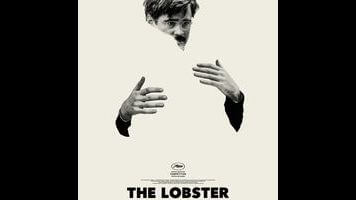Colin Farrell goes full-on frumpy in the darkly deadpan The Lobster

The demented deadpan comedy The Lobster takes place in an alternate reality where all adults have just 45 days to secure a romantic partner; if they fail to do so by the deadline, they’re turned into animals of their choosing. The film’s most striking transformation, however, isn’t so much man into beast as stud into dud. Can that really be Colin Farrell, the aging Irish heartthrob of In Bruges, under all that extra weight, those unflattering glasses, that bushy black mustache? As David, a sad-sack college professor facing the end of his marriage (and by extension, a future as the titular crustacean), Farrell hasn’t just undergone a dramatic physical makeover. There’s also a noticeable loss of swagger in his step, as if every drop of movie-star braggadocio has been drained from his (suddenly doughy) body. So confident is The Lobster in this illusion of ordinary-dude frumpiness that it actually seats the actor right next to John C. Reilly, all but inviting comparison. That’s just showing off.
Bizarre rules and rituals, deliberately stilted dialogue, flashes of grisly violence that threaten to tilt the humor straight into horror: All of this could only have come from the warped imagination of Greek filmmaker Yorgos Lanthimos, here making his singularly strange English-language debut. Lanthimos deals heavily in allegory. His international breakthrough, Dogtooth, tackled social conditioning (parental or otherwise) through a nightmare experiment in child rearing; it remains a shock-buzzer cult film for the ages. The director’s misunderstood Alps, about grief counselors hired to impersonate the recently deceased, was a stealth treatise on the fundamental absurdity of acting. With The Lobster, Lanthimos pivots to the pressure society puts on people to find companionship and settle down. The details of his oppressive dystopia—where single people are hunted like animals even before they’re turned into them and police demand documented proof of coupledom—create a fun-house reflection of our unforgiving dating culture. It could be an extended episode of Black Mirror, only with more laughs and fewer mobile devices.
The dialogue, penned by Lanthimos and his regular co-writer Efthymis Filippou, is all awkward alien chitchat—a grotesque parody of desperate first-date small talk. The film has the setup of a cruel, surreal rom-com, as newly divorced David checks himself into a seaside hotel, the dog that used to be his brother in tow. Will he find love at this mandatory singles retreat or take a plummet down the evolutionary ladder? David and his fellow guests endure endless dance-hall mixers, educational one-act plays on the dangers of not being in a relationship, and various forms of daily humiliation, like the public berating (and burning) administered to one lisping man (Reilly, whose tenure as Steve Brule has made him an old pro at delivering lines unnaturally) caught pleasuring himself. Residents also participate in group manhunts, earning extensions for each illegally single “Loner” they capture in the nearby woods.
As in Dogtooth, Lanthimos twists human behavior into a droll, pitiless science fiction: This is our world and this is not our world. One of the film’s sharper running gags concerns the extreme lengths people will go to in order to score a mate, manufacturing shared interests and bending their personalities for the sake of compatibility. Ben Whishaw plays a limping new arrival who takes to bashing his face into a table in hopes that a potential partner (Jessica Barden) will think that he, too, suffers from chronic nosebleeds. David, meanwhile, in response to his dwindling days and options, sets his sights on a “heartless” conquest (Dogtooth’s Angeliki Papoulia). In the film’s bleakly hilarious version of a meet cute, he successfully woos her by showing no concern whatsoever while she pretends to choke to death in a hot tub. (They also “bond” over their shared indifference to a suicide gone wrong—just one of several instances of Lanthimos using hideous injury as black-comic punctuation.)
The Lobster’s first hour is close to perfect in its merciless satire, creating a fully realized parallel universe as mundane as it is savage and a hero racing against a very different kind of biological clock. The film then shifts from the hotel to the surrounding forrest, where Léa Seydoux leads a posse of monk-like outlaws, and David begins to violate their codes, too, by falling in love with a fellow sworn single (Rachel Weisz, who narrates in an ominous monotone throughout). Lanthimos is making a point about how even staying unattached and staunchly preserving one’s autonomy is a form of cultural conformity, subject to its own bullshit expectations. But the metaphors get a little shakier during this passage and the brutal comedy less consistent (though there is the reliable sight gag of different animal species wandering through the background of the frame). What keeps The Lobster afloat is Farrell, who rarely seems to be fishing for laughs but gets them anyway, mostly by playing David’s fantastical romantic predicament completely straight. Lovelorn looks good on him. Love handles, too.